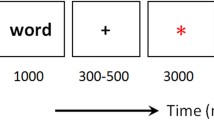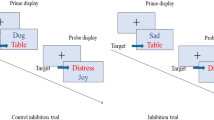Abstract
The present study investigated the impact of depressive rumination on encoding style using the item-cued directed forgetting procedure. High dysphoric (N = 40) and low dysphoric (N = 40) students were randomly allocated to either a rumination or distraction induction. Participants were shown intermixed negative, positive, and neutral words on a computer screen that were followed by instructions to remember or forget each word. High dysphoric participants in both the rumination and distraction conditions exhibited standard directed forgetting effects; i.e., better recall of to-be-remembered than to-be-forgotten words, for all word types. These findings do not support the proposal that rumination enhances the encoding of negative information in high dysphoric participants. Findings are discussed with reference to the contribution of retrieval processes, and with consideration of the application of the directed forgetting paradigm to affective disorders.
Similar content being viewed by others
Notes
Using Cohen’s formula, power for this design is estimated to be 87%, entering the parameters of 20 participants per group, effect size at 1.0 (large), and alpha at P = .05 (effect size based on those observed by Moulds & Bryant, 2002).
References
Basden, B. H., Basden, D. R., & Gargano, G. J. (1993). Directed forgetting in implicit and explicit memory tests: A comparison of methods. Journal of Experimental Psychology: Learning, Memory, and Cognition, 19, 603–616.
Beck, A. T., & Steer, R. A. (1990). Manual for the revised Beck Anxiety Inventory. San Antonio, TX: Psychological Corporation.
Beck, A. T., Steer, R. A., & Brown, G. K. (1996). Manual for the Beck Depression Inventory-II. San Antonio, TX: Psychological Corporation.
Blaney, P. H. (1986). Affect and memory: A review. Psychological Bulletin, 99, 229–246.
Bradley, B. P., Mogg, K., & Lee, S. C. (1997). Attentional biases for negative information in induced and naturally occurring dysphoria. Behaviour Research and Therapy, 35, 911–927.
Dalgleish, T., Spinks, H., Golden, A. M., & du Toit, P. (2004). Processing of emotional information in seasonal depression across different cognitive measures. Journal of Abnormal Psychology, 113, 116–126.
Dalgleish, T., & Watts, F. N. (1990). Biases of attention and memory in disorders of anxiety and depression. Clinical Psychology Review, 10, 589–604.
Denny, E. B., & Hunt, R. R. (1992). Affective valence and memory in depression: Dissociation of recall and fragment completion. Journal of Abnormal Psychology, 101, 575–580.
Ehlers, A., & Clark, D. M. (2000). A cognitive model of posttraumatic stress disorder. Behaviour Research and Therapy, 38, 319–345.
Francis, W. N., & Kucera, H. (1982). Frequency analysis of English usage: Lexicon and grammar. Boston: Houghton Mifflin.
Johnson, H. M. (1994). Processes of successful intentional forgetting. Psychological Bulletin, 116, 274–292.
Just, N., & Alloy, L. B. (1997). The response styles theory of depression: Tests and an extension of the theory. Journal of Abnormal Psychology, 106, 221–229.
Lyubomirsky, S., Caldwell, N. D., & Nolen-Hoeksema, S. (1998). Effects of ruminative and distracting responses to depressed mood on retrieval of autobiographical memories. Journal of Personality and Social Psychology, 75, 166–177.
Lyubomirsky, S., & Nolen-Hoeksema, S. (1995). Effects of self-focused rumination on negative thinking and interpersonal problem solving. Journal of Personality and Social Psychology, 69, 176–190.
Mathews, A., Ridgeway, V., & Williamson, D. A. (1996). Evidence for attention to threatening stimuli in depression. Behaviour Research and Therapy, 34, 695–705.
McNally, R. J., Metzger, L. J., Lasko, N. B., Clancy, S. A., & Pitman, R. K. (1998). Directed forgetting of trauma cues in adult survivors of childhood sexual abuse with and without posttraumatic stress disorder. Journal of Abnormal Psychology, 107, 596–601.
Moulds, M. L., & Bryant, R. A. (2002). Directed forgetting in acute stress disorder. Journal of Abnormal Psychology, 111, 175–179.
Nolen-Hoeksema, S. (1991). Responses to depression and their effects on the duration of depressive episodes. Journal of Abnormal Psychology, 100, 569–582.
Nolen-Hoeksema, S. (2000). The role of rumination in depressive disorders and mixed anxiety/depressive symptoms. Journal of Abnormal Psychology, 109, 504–511.
Nolen-Hoeksema, S., & Morrow, J. (1991). A prospective study of depression and posttraumatic stress symptoms after a natural disaster: The 1989 Loma Prieta earthquake. Journal of Personality and Social Psychology, 61, 115–121.
Nolen-Hoeksema, S., & Morrow, J. (1993). Effects of rumination and distraction on naturally occurring depressed mood. Cognition and Emotion, 7, 561–570.
Power, M. J., Dalgleish, T., Claudio, V., Tata, P., & Kentish, J. (2000). The directed forgetting task: Application to emotionally valent material. Journal of Affective Disorders, 57, 147–157.
Siegle, G. J., Steinhauer, S. R., Carter, C. S., Ramel, W., & Thase, M. E. (2003). Do the seconds turn into hours? Relationships between sustained pupil dilation in response to emotional information and self-reported rumination. Cognitive Therapy and Research, 27, 365–382.
Watkins, E., & Moulds, M. (2005). Distinct modes of ruminative self-focus: Impact of abstract versus concrete rumination on problem solving in depression. Emotion, 5, 319–328.
Watkins, E., & Teasdale, J. D. (2004). Adaptive and maladaptive self-focus in depression. Journal of Affective Disorders, 82, 1–8.
Watkins, E., Teasdale, J. D., & Williams, R. M. (2000). Decentring and distraction reduce over general autobiographical memory in depression. Psychological Medicine, 30, 911–920.
Wilhelm, S., McNally, R. J., Baer, L., & Florin, I. (1996). Directed forgetting in obsessive-compulsive disorder. Behaviour Research and Therapy, 34, 633–641.
Williams, J. M. G., Watts, F. N., MacLeod, C., & Mathews, A. (1997). Cognitive psychology and emotional disorders (2nd ed.). Chichester, UK: Wiley & Sons.
Acknowledgements
This research was supported by a grant from the Australian Research Council awarded to the second author. We are grateful to Susannah Starr for her assistance with data collection.
Author information
Authors and Affiliations
Rights and permissions
About this article
Cite this article
Wong, A.C.M., Moulds, M.L. Depressive Rumination and Directed Forgetting: An Examination of Encoding Style. Cogn Ther Res 32, 1–10 (2008). https://doi.org/10.1007/s10608-006-9107-9
Received:
Accepted:
Published:
Issue Date:
DOI: https://doi.org/10.1007/s10608-006-9107-9




